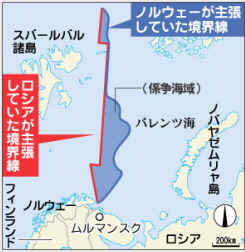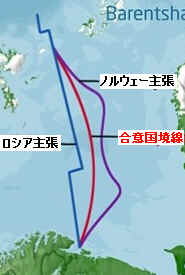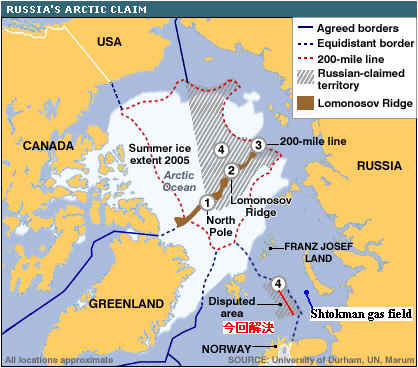

日本経済新聞 2010/9/24
ロシア首相「北極圏、平和的に開発」
ロシアのプーチン首相は23日、モスクワで開いた北極圏に関する国際会議で演説し、関係各国と平和的にエネルギー 開発を進める考えを示した。豊富な天然資源がある北極圏ではロシアや米国、カナダなど各国が開発に関心を示している。首相は権益問題の解決に交渉が必要と 強調した。
首相は「北極圏での資源を巡る争奪戦の懸念があるとの予測があるが、全く根拠がない」と述べた。北極圏で平和と協調を維持する必要があるとし、外資の導入を歓迎する方針を示した。
ロシアは2007年に潜水艇で北極点の海底を探査し、国旗を打ち立てるなど、同地域での権益拡大に乗り出していた。ロシアは同地域で推定 1000億トンの原油・ガス権益を持つと主張してきたが、プーチン首相は「各国の主張が異なる権益は、最終的に国連が管理するだろう」と述べた。
ロシアは今月、北極海での国境線を巡り対立してきたノルウェーと境界の画定条約に調印。協調して資源開発を進める政策に転換している。
2010/9/27 毎日新聞
北極圏:資源争奪戦、ロシアが一転友好姿勢 開発へ、欧米技術が不可欠
豊富な資源が眠る北極圏で、強硬に自国の領有権を主張してきたロシアが最近、関係国との協調姿勢に転じている。北極海の商業航路が昨年、開かれるなど圏内の開発が本格化する中、欧米の先進技術が資源開発に欠かせないと認識したためだ。
ロシアは今月22、23日、同国で初めての北極問題に関する国際会議を開催。プーチン首相は基調演説で「領有権問題は話し合いや国際法に基づき解決できる」と友好姿勢を打ち出した。
これに先立ち、今月15日にはノルウェーとの間で、40年間にわたり係争してきたバレンツ海と北極海の大陸棚を等分する合意文書に調印した。プー チン首相は「北極圏の関係国が受け入れ可能な譲歩を見いだす好例」とした。未画定の境界線問題を、ロシア、米国、カナダ、ノルウェー、デンマーク(自治領 グリーンランドを領有)の北極海沿岸5カ国で、話し合い解決するとの意思を示すものだ。
ロシアは07年に北極点から約4000メートル真下の海底まで深海潜水艇を到達させて自国旗を立てるなど、強硬姿勢が目立っていた。昨春には北極 圏の権益を守る部隊を軍内に創設する方針を打ち出したが、同部隊についても「船舶航行の安全を保障する部隊と装備を強化するが、北極へ派遣する計画はな い」(外務省)と柔軟姿勢に転じている。
北極圏にはこれまで、地球上の未発見資源の4分の1が埋蔵されているとされてきたが、厳しい気候と厚い氷が開発の障害になってきたため、大きな領有権問題になっていなかった。ところが地球温暖化により夏季の氷が減ったことで開発熱が高まった。
ロシアは北極圏開発の一環として、北シベリア・ヤマル半島沖のガス田開発に意欲を示す。氷の下にある資源の採掘には、北極圏の資源開発の経験があ るノルウェーの資源大手「スタトオイル」などの技術が欠かせないといわれる。メドベージェフ露大統領も「ノルウェーの最先端の技術を我が国の石油・ガスの 近代化に利用したい」と協力を呼びかけている。
==============
■ことば
◇北極圏の領有権
94年に発効した国連海洋法条約は、自国沿岸から200カイリ(約370キロ)までを排他的経済水域(EEZ)として資源開発ができると規定して いる。それを超える海底では自国領の大陸棚から地形・地質的につながることを証明し、国連の「大陸棚限界に関する委員会」の認定を受ければ開発が可能とな る。ロシアは北極海の海底山脈・ロモノソフ海嶺(かいれい)など120万平方キロを自国につながる大陸棚として申請している。
2010/4/28 毎日新聞
ロシア:ノルウェーとの大陸棚境界を画定 係争域2等分
ロシアとノルウェーは27日、北極圏のバレンツ海と北極海で40年にわたり争ってきた大陸棚の境界を画定することで基本合意し た。約17万5000平方キロの係争海域を2等分する方法で、天然ガスなど豊富な海底エネルギー資源の共同開発を視野に、お互いが歩み寄ったといえる。
両国は9月15日、バレンツ海と北極海での係争海域を2等分する形で最終解決し、同地域の開発でも協力する条約に署名した。ソ連時代から40年に及ぶ境界画定論争に終止符を打ち、天然ガスや石油など資源探査・採掘、漁場資源開発で協力を図る。
 |
→ |  |
ノルウェーは07年、バレンツ海のスノービット・ガス田で天然ガスの生産を開始した。一方、ロシアも2016年をめどにバレンツ海でシュトクマン・ガス 田の生産開始を計画。しかし、現時点で氷の下に埋蔵されている資源の採掘技術を持たないため、「ノルウェーの優れた技術の導入を望んでいる」(エネルギー 問題の専門家)といわれる。メドベージェフ大統領は会見で「(境界画定の)合意を実践するためには、共同開発が求められている」と述べ、ノルウェーとの共 同資源開発に期待を示した。
ノルウェーは冷戦時代の1970年から、当時のソ連とバレンツ海などの境界画定をめぐり交渉を続けてきた。係争海域は日本の領土のほぼ半分に相当 する。
ロシアは2008年、ソ連時代から係争してきた中国との東部国境画定にあたり、国境の川の島をほぼ2等分することで最終解決しており、今回も同様の手法を採用した形だ。
-------
2010/4/29 Pravda
Russia and Norway Divide
the Arctic Sea
Russia and Norway have finally reached an agreement over the
demarcation of borders in the Arctic Sea. An announcement was
made on 27th April by the President of Norway, Jens Stoltenberg,
who commented on the conclusions of discussions with the
President of the Russian Federation, Dmitry Medvedev.
The head of the Scandinavian state acknowledged that this had
been “the most important unresolved
question between Russia and Norway…we have been discussing this
problem for 40 years”. At question are those parts of
the ocean area near the border, chiefly the Barents Sea, which
covers a total of 175 thousand square kilometers. Attempts to
clarify the borders in a way that pleased both Russian and
Norwegian parties have, until recently, been unsuccessful.
During the Soviet period, the main reason for this lack of
success was the Cold War, with the Norwegian section of the
border being a point of particular tension. The “Orion” patrol planes which frequently
flouted the border caused our anti-aircraft defenses more than a
little trouble.
Hope for a resolution of the dispute did not appear until 2007,
when an agreement was signed on the marking of borders in the
Varanger Fjord (Variazhskii Gulf of the Barents Sea) between the
Rybachii Peninsular (Russian Federation) and the Varanger
Peninsular (Norway). However, this is only the southern part of
the disputed area, the argument over which has been made
particularly fierce by the identification of rich oil and gas
deposits. Moreover, its waters are abundant in fish.
Now the long-running conflict has been resolved, opening up
extensive opportunities for Russia to work with Norway to realize
new projects in the Arctic, including gas extraction. In the
words of President Medvedev, “when the final boundaries have
been decided, it may turn out that - in order to extract certain
deposits - partnership will be required”.
Key in this regard is Russia’s inability to extract petroleum
independently, without Norwegian aid, from deep-sea artic sites, due to a lack of essential, unique
technology, which Norway possesses, and with the help of which
the Norwegian company StatoilHydro, in conjunction with Gazprom
and the French Total, exploits the famous Shtokman gas
deposit in
the Barents Sea.
The two countries’
leaders did not
fail to touch upon another important issue during their meeting.
As is well known, the USA, Canada, and Denmark also lay claims to
the Arctic Shelf; Russia is counting on the mutual support of
Norway to defend its interests in the region during the coming
sharing out of Arctic riches. According to Medvedev, “in this area our positions are
very close; we simply have to help each other, and, perhaps in
some instances, to come to an agreement with third countries who
occasionally display a genuine interest in having their own
presence in this region. It is these third countries which we
must be constantly aware of.
"I take as my starting point the fact that fundamental
responsibility lies, nonetheless, on us in this regard, as on
those countries immediately located in the Arctic region and
regarding it as a place for life and for the use of economic
possibilities”, the President stressed.
The positive direction that was taken in the meeting had a
bearing on yet another issue. As announced by the Norwegian
president, Russia and Norway could in the very near future sign
an agreement on the abolition of visas for citizens living on the
borders of the two countries. Oslo is interested in the
additional workforce from Russia, with Norwegian authorities ever
more frequently attracting Northern Russian citizens to work in
Norway in recent times. In this connection, a simplification of
the procedures for obtaining a visa was suggested.
Natalia Antiushina, the head of scientific employees at the
Centre of Countries of Northern Europe, RAN, believes that it is
not incidental that it is precisely now that the solution to the
problem of many decades has been found. As she commented to “Pravda.ru”, “the signing of the agreement was
made possible by the fact that in Norway the left “red-green’
coalition is in
power, which, unlike the right, considers partnership with Russia
to be of great importance. This partnership is, after all,
already developing in the North of our country, and with much
success. You only have to note our partnership with the large
Norwegian gas company “StatoilHydro”
in the exploitation
of petroleum deposits in the Barents Sea. Or Russia’s use of Norwegian gas
transportation capabilities to export fuel to the UK.
Concluding her comments, Natalia Antiushina said: “For the Russian North, the
agreements reached today are extremely important, especially
given the fact that, as Arctic ices thaw, a significant part of
the Arctic Ocean could become suitable for development.”
Prospects for cooperation
in the field of fishing remain extremely promising, although
there continue to be some complications. Stoltenberg spoke
positively of the character of current cooperation in this area,
thanks to which a number of existing problems have been
successfully resolved. Here, he was referring to the agreement
already in place on quotas for fishing in the Barents Sea, which,
along with the corresponding regulatory services, have allowed
the extensive, often damaging fishing of the northern latitudes
(in which both Russian and Norwegian citizens, as well as those
of several other counties, are involved) to be limited. In his
turn, the Russian president also expressed hope that the signing
of a boundary agreement would allow our fishermen to “feel more comfortable and more
protected”.
Here it is relevant to mention the detention of Russian fishing
vessels which, until recently, has been a regular occurrence,
incidents taking place with particular frequency in the area
surrounding Spitzbergen archipelago. According to the Paris
Agreement of 1920, this is Norwegian territory, but Russia has
the right to engage in economic activities there, including
fishing.
In 1977, however, in violation of this agreement, Norway extended
its fish preservation zone from 3 to 200 miles, changes which
Russia does not recognize, and which have therefore led to the
detention of our vessels. By 2008, the situation had become so
bitter that our country was forced to dispatch naval vessels to
Spitzenberg. Now, though, in view of the new directions evident
in today’s agreement, hope has appeared
that this problem, too, will soon be resolved.